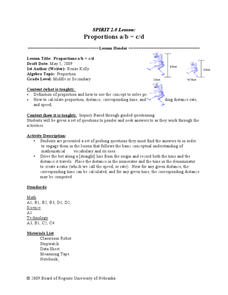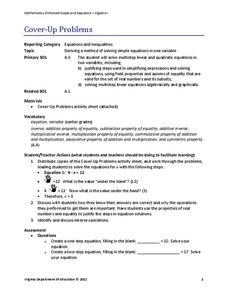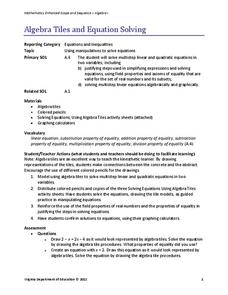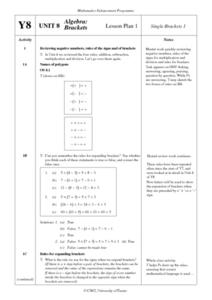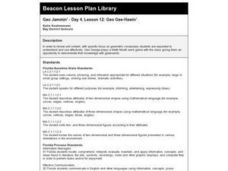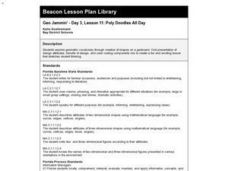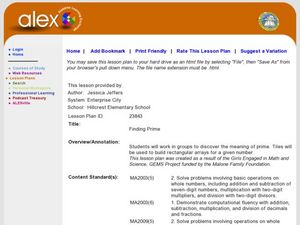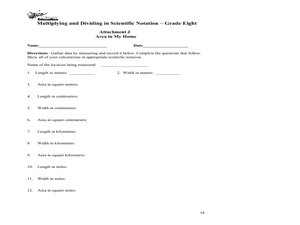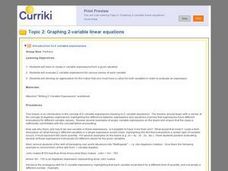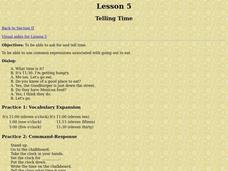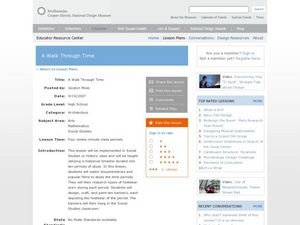Curated OER
Proportions a/b=c/d
Students calculate distance and proportion of objects. In this algebra lesson, students define proportion and how it is used in math. They solve the problem through guided instruction.
Virginia Department of Education
Cover Up Problems
Don't cover up this resource — use it out in the open! Pupils learn how to cover up various parts of a linear equation in order to help solve the equation. A worksheet of problems provides practice with this skill.
Virginia Department of Education
Algebra Tiles and Solving Equations
Young mathematicians solve linear equations by drawing models of algebra tiles using colored pencils. To finish, they solve the same equations algebraically and check their answers using a graphing calculator.
Texas Education Agency (TEA)
Geometry in Architecture #1
Discover how to analyze architecture from a geometric standpoint. The fourth installment of an 11-part unit on architecture first provides a presentation on axis, balance, basic form, formal, pattern, proportion, symmetry, and tripartite...
Virginia Department of Education
Similar Figures
How similar do figures have to be to be similar figures? Individuals learn to identify similar figures by verifying that angles are congruent and sides are proportional. Additionally, they match the corresponding parts of similar figures.
Virginia Department of Education
Balanced
Bring balance to your lesson plans with an activity that asks individuals to solve one-step linear equations with inverse operations. Balance scales help learners understand the concept of isolating the variable.
Curated OER
Algebra: Brackets
Students review and practice negative numbers, rules of signs and of brackets that include addition, subtraction, multiplication and division. Included in this lesson is polygons and expanding brackets. Mastery of mathematical language...
Curated OER
Sieve of Eratosthenes
Learners discover the Sieve of Erathosthenes. They explore a method to find all the prime numbers in a group of numbers. Using models, students practice divisibility rules while examining the difference between prime and composite numbers.
Curated OER
Geo Jammin' - Day 4, Lesson 12: Geo Gee-Hawin'
Students review geometry unit content through a vocabulary/word game. They demonstrate understanding using geoboards to answer questions. They work in groups and it's a race to the correct answer.
Curated OER
Geo Jammin' - Day 3, Lesson 11: Poly Doodles All Day
Students explore geometric vocabulary through creation of shapes on a geoboard. They present design attributes, transfer of design, and color-coding components mix to create a fun and exciting lesson plan that stretches student thinking.
Alabama Learning Exchange
Finding Prime
Fifth and sixth graders explore prime numbers. They work with a partner to build rectangular arrays using twelve tiles. Factor pairs are noted and recorded on graph paper. Pupils construct rectangular arrays with a prime number and...
Curated OER
Vegetable Print Patterns
Create a unique print using vegetable stencils and tempera paints applied to grid like pattern formed from cut pieces of paper. Your students will choose either a warm or a cool color scheme.
S2tem Centers SC
Investigating Chance Processes of Probability
How likely is it that the school cafeteria will serve chicken tomorrow? Discover the concept of probability with the roll of the dice. Pupils evaluate the liklihood of several statments about everyday life. Then, a mathematical...
Ohio Department of Education
Multiplying and Dividing in Scientific Notation - Grade 8
Here is really nice set of resources on scientific notation. Eighth and ninth graders explore the concept of multiplying and dividing in scientific notation. For this multiplying and dividing numbers in scientific notation...
Curated OER
Cutting Corners - Parts 1 and 2
Students use optimization concepts to design their own container. In this optimization lesson plan, students understand how the optimization concept is critical in calculus and why products are packaged the way they are.
Curated OER
Come Tool Along With Me
Young scholars create metallic Bas-relief scultures using basic art supplies and the technique of "tooling" in this Art instructional activity with croos-curricular connections in Social Studies and Math. A scoring rubric is included for...
Ohio Department of Education
The Solution is Complex
Consider complex numbers, roots, and quadratic equations. Use the discriminate as a way to determine the nature of a quadratic's roots. Then discuss the similarities and differences between quadratics with two, one, or no real roots....
Curated OER
Does Your Field Measure Up
Young scholars measure angles using a plane table kit. In this geometry lesson, students use trigonometric identities to find the values of the length of a football field.
Balanced Assessment
Sharp-Ness
Transform pupils into mathematicians as they create their own definitions and formulas. Scholars examine an assortment of triangles and create a definition and formula for determining the sharpness of the vertex angle. The groups of...
Concord Consortium
Square-Ness
Are there some rectangles that are more square than others? A thought-provoking task asks individuals to create a formula that objectifies the square-ness of a set of rectangles. They then use their formulas to rank a set of...
Curated OER
Reading in Context: The Diary of Anne Frank
Step into the hopeful and tragic world of Anne Frank with this lesson on reading in context. After complete a variety of activities related to the first two scenes of The Diary of Anne Frank, eighth graders participate in a read...
Curated OER
Topic 2: Graphing 2-Variable Linear Equations
Students explore the concept of 2-variable equations and expressions. In this 2-variable equation and expression lesson, students translate 2-variable word problems into 2-variable equations and expressions.
Curated OER
Telling Time
Students use common expressions associated with going ou to eat to practice telling time. They engage in a dialogue with the teacher both asking for things at the right time and answering questions about time approximations.
Curated OER
A Walk Through Time
Students investigate the types of footwear worn during ten periods of history. In this secondary, art/math/social studies lesson, students view documentaries and popular films to study the time periods. Students research the...
